CNN
Overseas voters – now a bloc that could be crucial for Democrats – targeted by GOP lawsuits in battleground states
Published
3 months agoon

By Tierney Sneed, Alayna Treene and Edward-Isaac Dovere, CNN
8 minute read
Published 4:00 AM EDT, Thu October 17, 2024

RALEIGH, NORTH CAROLINA – SEPTEMBER 17: Absentee ballots are prepared to be mailed at the Wake County Board of Elections on September 17, 2024 in Raleigh, North Carolina. North Carolina will send out absentee ballots to military and overseas citizens by September 20. Other absentee ballots will be sent by September 24 to voters who requested ballots by mail. Early voting begins October 17. (Photo by Allison Joyce/Getty Images) Allison Joyce/Getty ImagesCNN —
An overseas ballot process that has long been seen as sacrosanct by both parties, due to its connection to US military members serving in foreign countries, is the target of multiple GOP-backed lawsuits filed in recent days.
The new legal assault comes as ballots cast by Americans abroad have become very favorable for Democrats and could be crucial in getting Vice President Kamala Harris over the finish line.
In addition to the new lawsuits filed by Republicans in Pennsylvania, North Carolina and Michigan, former President Donald Trump has suggested without evidence that the overseas vote is a source of fraud, even as he has made entreaties to Americans abroad with a campaign promise of lowering their taxes.
There are about 6.5 million eligible American voters living, serving and studying overseas, with about 1.6 million of them in battleground states, and more in tight House districts. Those votes could be decisive: The 2020 election was decided by 44,000 votes over four states.
More than 1.2 million ballots were sent abroad in 2020 and nearly 890,000 were eventually counted, according to a report by the US Election Assistance Commission.
Democrats have painted new GOP legal challenges as an attack on the franchise of service people who are putting their lives on the line for the country by serving abroad, though the civilian expat community is more centrally in the crosshairs of the Republican lawsuits. Election officials also say that last-minute changes to election procedures with ballots already sent out would not only disenfranchise voters but lay the groundwork to falsely cast doubt on the results.
Ad Feedback
Lawyers for Michigan Secretary of State Jocelyn Benson, a Democrat, accused Republicans in a court filing of seeking “to harass the Secretary and sow doubt about the integrity of the election.”
In Pennsylvania, GOP congressmen are asking the court to set aside all ballots cast from overseas, including those from military voters, for further verification. The Republican National Committee, which is behind the lawsuits in Michigan and North Carolina, made similar requests for certain overseas ballots in those states to be segregated, foreshadowing the possibility for post-election fights to get those ballots tossed if the margins are tight.
The Republicans will have to overcome several procedural issues that have been raised about their cases. But any court order setting overseas ballots aside to be counted later, after the disputes are resolved, risks giving Trump the appearance of a lead on Election Night that would likely be diminished once those ballots were added into the results. Key to Trump’s strategy in his efforts to overturn the election in 2020 was to argue that ballot-counting should stop after Election Day, before election officials had finished processing the Democratic-heavy mail-in vote.
GOP officials say that they’re trying to obtain clarity from courts about what they’ve described as legal conflict in how those states are handling those ballots, as it’s not entirely clear how many ballots would be tossed if they were to prevail in their cases.
“Regardless of the number impacted…we want every single legal vote to be counted properly, and counting illegitimate votes dilutes that and cancels it,” one RNC official told CNN.
A hearing in the Michigan case is scheduled in Detroit on Thursday, while a federal judge will hear arguments on the Pennsylvania lawsuit on Friday in Harrisburg. A hearing in the North Carolina lawsuit is scheduled for next week.
Less than half of overseas voters are military
The process for uniformed and civilian citizens abroad to cast ballots was established by the federal law known as Uniformed and Overseas Citizens Absentee Voting Act, or UOCAVA, which has enjoyed bipartisan support in the nearly four decades it’s been on the books.
The law is most associated with military voters, which are traditionally thought of as right-leaning, though that population is not as conservative as it once was. More significant to the political dynamics at play, however, is how the civilian overseas vote has eclipsed military voters abroad.
Members of the military made up only 42.3% of those registered to vote under UOCAVA during the 2020 election, according to the EAC report.
Only a quarter of the ballots transmitted abroad by Michigan in 2020 went to military members, according to the report, and likewise in Pennsylvania and North Carolina, military members made up a minority of the overseas voters receiving ballots from those states in 2020.
“As it turns out, there are more overseas civilian voters than there are military voters,” said Michael McDonald, a University of Florida political science professor. Research he’s done on Maine and Colorado voters has shown that the UOCAVA vote in those states has had a sizable Democratic-lean.
Democrats Abroad, which is made up of thousands of Americans living, serving and studying around the world, has been phone banking, texting and emailing its database since January, according to its international chair, Martha McDevitt-Pugh, urging members to request ballots and giving them instructions on how to get them in.
“We are millions of voters who can affect the outcome of elections,” said McDevitt-Pugh.
The Democratic effort caught the attention of Republicans, a person familiar with the litigation told CNN, prompting lawsuits challenging the legality of a subset of those ballots.
In lawsuits filed in North Carolina and Michigan, the Republican National Committee is focused on state laws that extended UOCAVA’s scope by establishing that US citizens abroad who never lived in those states can still vote if their parents or legal guardians lived there before leaving the country. (Michigan additionally extends this tie to spouses of former residents of the state).
They argue those laws run afoul of provisions in the states’ constitutions requiring residency to vote.
“North Carolinians and Michiganders should not have their votes canceled by those who’ve never lived in the state in the first place – plain and simple. This is illegal and we will stop it. While Democrats want an election system that disregards the law, we are committed to election integrity across the country,” GOP Chairman Michael Whatley said in a statement last week.
However, Democrats and state officials counter that the North Carolina and Michigan constitutions give those state legislatures flexibility to expand voter eligibility to beyond just those who have lived in those states for a certain amount of time.
In Michigan, the Republicans are asking that guidance from Benson, a frequent target of GOP lawsuits, be changed to instruct local officials that they cannot accept overseas ballots by so-called “never residents.”
Her office says that there is no practical way of distinguishing ballots that come from overseas voters who have never resided in those states, and even if there was, reworking the procedures at this point would be impossible – an argument also made by the North Carolina election officials who are being sued by the RNC.
“The time to challenge the rules for voter eligibility is well before an election, not after votes have already been cast,” Patrick Gannon, a spokesperson for the North Carolina Board of the Elections told CNN, noting that the law in question was passed by state lawmakers more than 13 years ago.
Pressed on the timing of the lawsuits, which were filed after election officials began sending out overseas ballots, a second RNC official claimed that much of their election integrity litigation is being decided in the weeks before Election Day.
“Just because, maybe theoretically, it’d be better if we can file earlier, we’re still going to fight in court if we think election laws are being broken, regardless of what’s happening,” the official told CNN, adding that there were election cases being decided during this period before the 2022 midterms.
GOP congressmen suing their own state
In the Pennsylvania case, the dispute is over how overseas ballots are being vetted.
Republican members of the US House have sued in federal court over how Pennsylvania election officials are processing the applications from overseas citizens and are asking for a court order that would segregate those ballots for further verification.
The congressional plaintiffs all voted in favor of rejecting the 2020 election state certifications in Joe Biden’s favor, despite a lack of evidence of fraud. Democrats, who intervened in the case, argue that the Republican lawmakers’ request could disenfranchise “tens of thousands” of overseas voters, including those in uniform.
Rep. Pat Ryan, running for reelection in upstate New York, led several of his fellow veteran Democratic colleagues in putting together a letter this week addressed to Defense Secretary Lloyd Austin warning that members of the military are at risk of having their votes infringed.
“I didn’t think they could be even more disrespectful of veterans than Trump has been, yet somehow they’ve gone even further in insulting and trying to disenfranchise veterans and military families,” Ryan told CNN, calling the moves “stunning” and “a disgrace.”
Ryan, who voted from Iraq in 2008 nearing the end of his 15-month second combat zone deployment, called the procedures a “well-oiled process that happens all the time and has been happening for many decades.”
He noted that each unit had a voting assistance officer and that everyone’s identity had been verified many times long before they filled out their ballots.
If election denialism is the goal, Ryan said, “putting our active duty troops in the middle of that traitorous behavior is beyond the pale.”
“These people are risking their lives for our country. They deserve to know now that their vote will be protected and counted,” he said.
The lawyers who brought the lawsuit on behalf of the Republicans did not respond to CNN’s inquiry, but in their complaint, they claim that Pennsylvania has “implemented an illegal election structure that creates vulnerabilities and the opportunity for ineligible ballots to dilute valid ballots from military service members.”
Those involved in the RNC cases in Michigan and North Carolina stressed that those legal challenges were not directed at military ballots but civilians who never lived in those states.
“By allowing overseas voters who never lived in Michigan or North Carolina to vote there, they are violating the state constitutions and jeopardizing eligible votes,” Claire Zunk, the RNC’s election integrity communications director, said in a statement. “Our lawsuit does not in any way affect military voters’ right to vote, which is protected by federal law under UOCAVA. We are fighting to protect the votes of military voters and overseas citizens to be counted properly, and not canceled by ineligible votes.”
McDevitt-Pugh, the Democrats Abroad chair, said that, with laws about taxation, Social Security and health care affecting her and other Americans living overseas, “being able to vote and having a voice is really important to us.”
She said that she feared that even the challenges being raised might drive down the number of people who returned their ballots.
“They’re meant to open the door to challenge the election afterward, they’re meant to intimidate voters,” she told CNN.
You may like
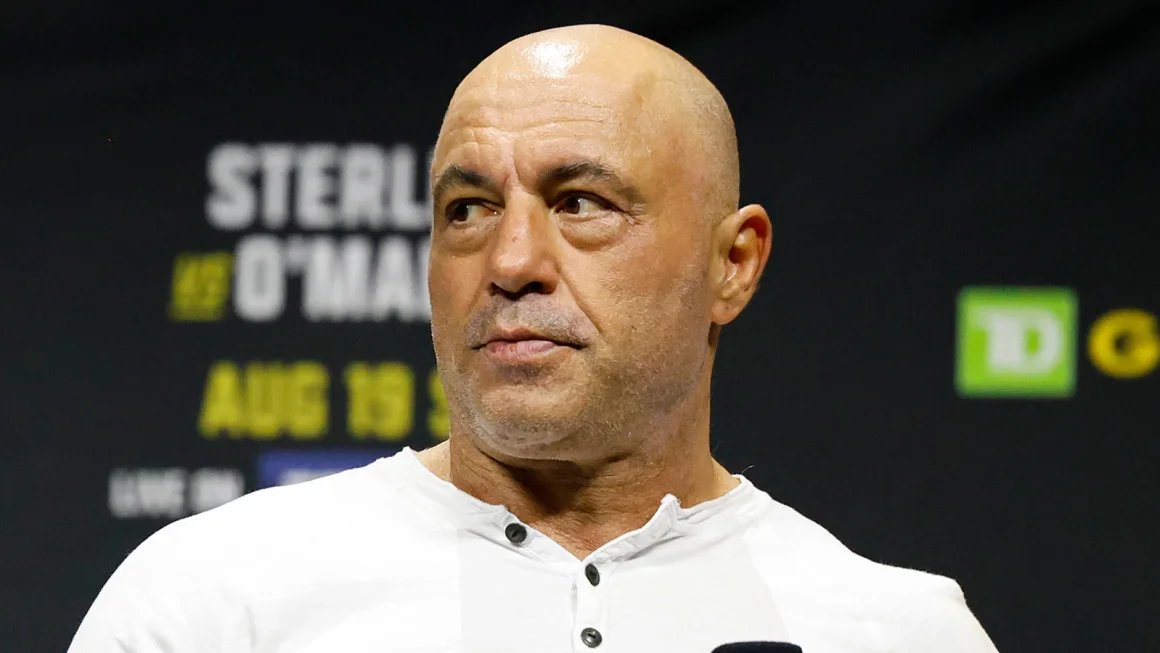
By Alayna Treene and Kate Sullivan, CNN
2 minute read
Published 9:43 PM EST, Mon November 4, 2024

Joe Rogan is seen at the ceremonial weigh-in for the UFC 292 mixed martial arts event, Friday, Aug. 18, 2023, in Boston. Gregory Payan/AP/FileCNN —
Popular podcast host Joe Rogan officially endorsed Donald Trump on the eve of the election, a move Trump’s team swiftly touted as a major win in the final hours of their campaign.
Rogan on Monday released his latest podcast featuring a two-and-a-half-hour interview with billionaire X owner and top Trump surrogate Elon Musk. Rogan then posted on X: “The great and powerful @elonmusk. If it wasn’t for him we’d be f**ked. He makes what I think is the most compelling case for Trump you’ll hear, and I agree with him every step of the way.”
“For the record, yes, that’s an endorsement of Trump. Enjoy the podcast,” he added.
The endorsement comes just weeks after Rogan interviewed Trump on “The Joe Rogan Experience,” an interview that was months in the making for the Trump campaign and viewed widely by the former president’s advisers as the crowning achievement of their media strategy to target young men and low-propensity voters by having Trump appear on podcasts catering to the demographic.
Trump, who was onstage in Pittsburgh, Pennsylvania, for his penultimate rally when Rogan made the endorsement, swiftly touted the development.
“It just came over the wires that Joe Rogan just endorsed me, is that great. Thank you, Joe. That’s so nice. And he doesn’t do that, he doesn’t do that stuff,” Trump said.
Trump said, “And he tends to be a little bit more liberal than some of the people in this room.”
Last week, Rogan posted on X that he had declined an offer from Vice President Kamala Harris’ campaign to do an interview.
“Also, for the record the Harris campaign has not passed on doing the podcast. They offered a date for Tuesday, but I would have had to travel to her and they only wanted to do an hour. I strongly feel the best way to do it is in the studio in Austin,” Rogan said. “My sincere wish is to just have a nice conversation and get to know her as a human being. I really hope we can make it happen.”
The Harris campaign declined to comment on Rogan’s post.
CNN
Trump describes US as an occupied country in dark closing message focused on immigration
Published
3 months agoon
November 5, 2024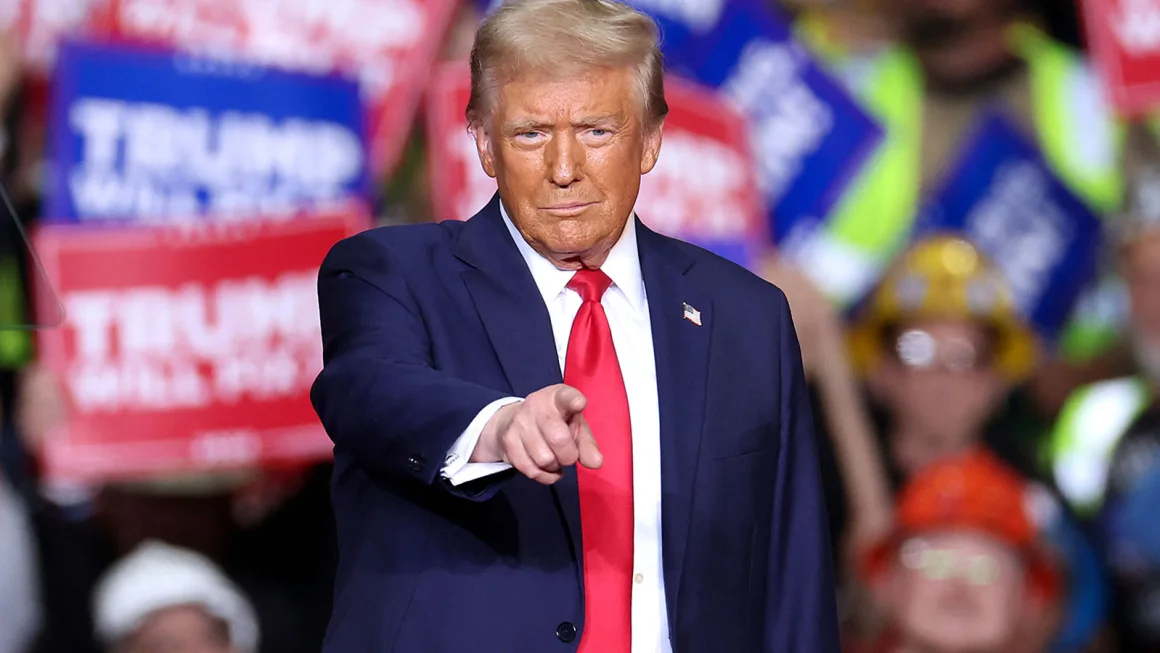
By Eric Bradner and Kate Sullivan, CNN
4 minute read
Updated 2:10 AM EST, Tue November 5, 2024

Former President Donald Trump gestures during a campaign rally in Pittsburgh, Pennsylvania on Monday, November 4. Charly Triballeau/AFP/Getty ImagesCNN —
Donald Trump described the United States as an “occupied country,” pointing to both undocumented and legal migrants as he pledged Monday to “rescue every city and town that has been invaded and conquered.”
The former president’s comments, at his election eve rally in the critical battleground state of Pennsylvania, underscore the dark and dystopian image he is portraying as he and Vice President Kamala Harris make their final arguments to voters ahead of Tuesday’s election.
Trump made little distinction between undocumented immigrants he said had overrun an apartment complex in Colorado and thousands of Haitian migrants who entered the United States legally and live in Springfield, Ohio.
“These are military invasions without the uniforms. That’s all it is,” Trump said, as he vowed to launch a massive deportation effort.
Trump was closing his third presidential campaign Monday with the same anti-immigration rhetoric that he used to launch his first White House bid. He described a nation in decline, overrun by migrant crime, much as he did in his first inaugural address, when he vowed to stop the “American carnage.”
The former president said he would target migrant gangs, ban sanctuary cities and seek the death penalty for any migrant that kills a US citizen. He invited conservative commentator Megyn Kelly on stage. Kelly listed several people killed by undocumented immigrants. Her appearance was particularly notable after Trump ripped Kelly for the way she asked him tough questions while moderating a Republican presidential primary debate in 2015, starting off months of sparring over social media and in subsequent interviews.
Trump also said he would rejuvenate US manufacturing by imposing steep tariffs on automotive products manufactured in Mexico, steel made in China and more – a proposal that economists have said would increase inflation, because the businesses charged those tariffs for importing foreign-made goods would pass the additional costs on to American consumers.
“Four years of Kamala have delivered nothing but economic hell for the American workers,” Trump said.
And Trump railed against the length of time it takes for votes to be counted and the usage of electronic voting machines, calling for single-day voting that would all be done on paper. It was a long discussion that is contrary to previous messaging from Trump and his campaign, which has encouraged people to vote early.
“I do believe it is too big to rig. I think it’s too big to rig. They’ll try. And they are trying, you know, but it’s too big to rig. This is a big movement. This is, you know, we did great in 2016, we did much better in 2020 but a lot of bad things happened,” Trump said. “This is that big, powerful, vicious party, though. No, it’s a vicious machine. I mean, they can take all these bad ideas and win elections. It’s like, there’s only a way you can do that. One way, there’s only one way.”
He added, “We have to win the old fashioned way and then fix it. But we have to fix it. We can’t allow this to happen. And remember, the states are essentially an agent, if I can use that term, but they’re an agent of the federal government. The states are doing the collecting, so to speak, and they have to take their orders from the federal government. And how can they do this when they say it’s going to take days long.”
The former president’s closing message of the 2024 race was a familiar one, as he delivered a lengthy speech in Pittsburgh – his third of four rallies scheduled for Monday after visits to North Carolina and eastern Pennsylvania with one more stop in Michigan. In a nod to the city’s sporting history, Trump discussed Pittsburgh Pirates’ star Roberto Clemente for an extended period near the end of his speech and brought the late Puerto Rican star’s son on stage for a few words.
Harris also ended her campaign with a blitz across Pennsylvania. The two candidates’ time spent in the Keystone State underscores the importance of its 19 electoral college votes — without which both candidates’ paths to the 270 necessary to win the presidency would be much more daunting.
Both campaigns have largely focused on seven battlegrounds: the “blue wall” of Michigan, Pennsylvania and Wisconsin, which Trump won in 2016 but President Joe Biden reclaimed in 2020, and four Sun Belt states: Arizona, Georgia, Nevada and North Carolina.
CNN
Trump argues he’s really running against “an evil Democrat system,” not Harris, during his final rally
Published
3 months agoon
November 5, 2024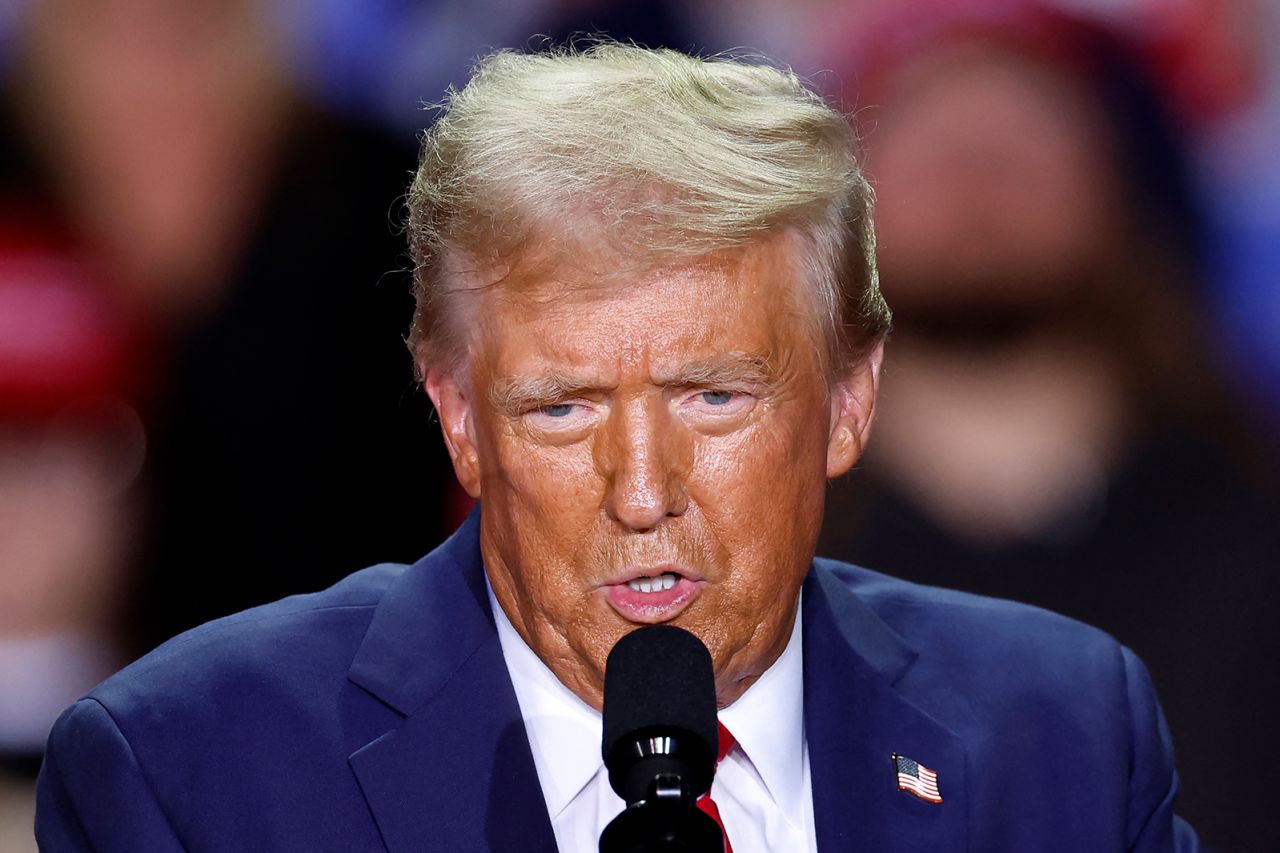
From CNN’s Kate Sullivan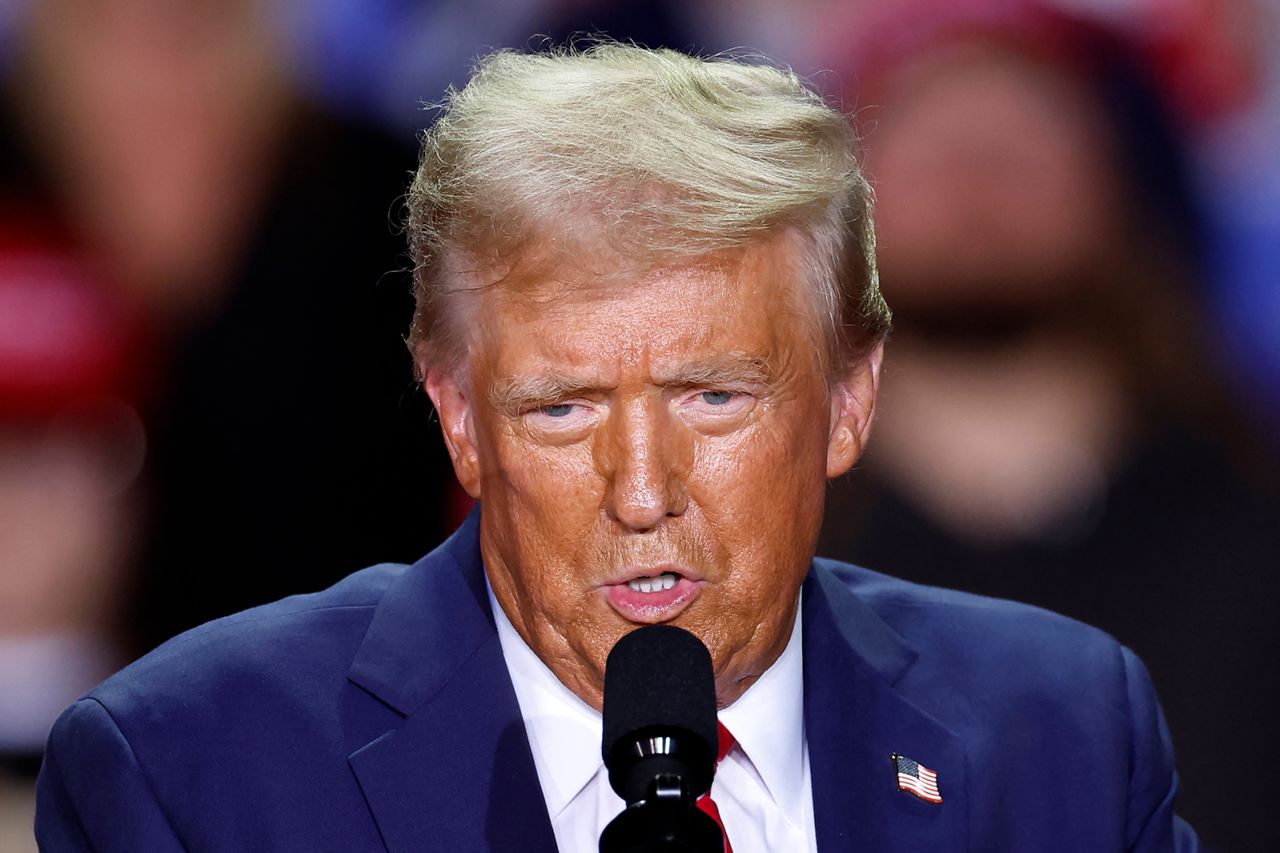
Donald Trump speaks during a campaign rally at Van Andel Arena in Grand Rapids, Michigan on November 5. Kamil Krzaczynski/AFP/Getty Images
Former President Donald Trump argued during the final rally of his campaign that his real opponent this election was not Vice President Kamala Harris but instead “an evil Democrat system.”
“We will defeat the corrupt system in Washington. Because I’m not running against Kamala, I’m running against an evil Democrat system. These are evil people,” Trump said during his rally in Grand Rapids, Michigan, that started well after midnight.
“The silent majority is back and tomorrow you need to get out and vote,” Trump said.
“This has been an incredible journey. And it’s very sad in a way, because, you know, we’ve done all these, and this is the last one, but here’s the good news, all we were doing is putting ourselves in a position to win, which we can do tomorrow very easily if we show up,” he added.
It’s decision day in America. Here’s what to watch for
From CNN’s Eric Bradner and Gregory Krieg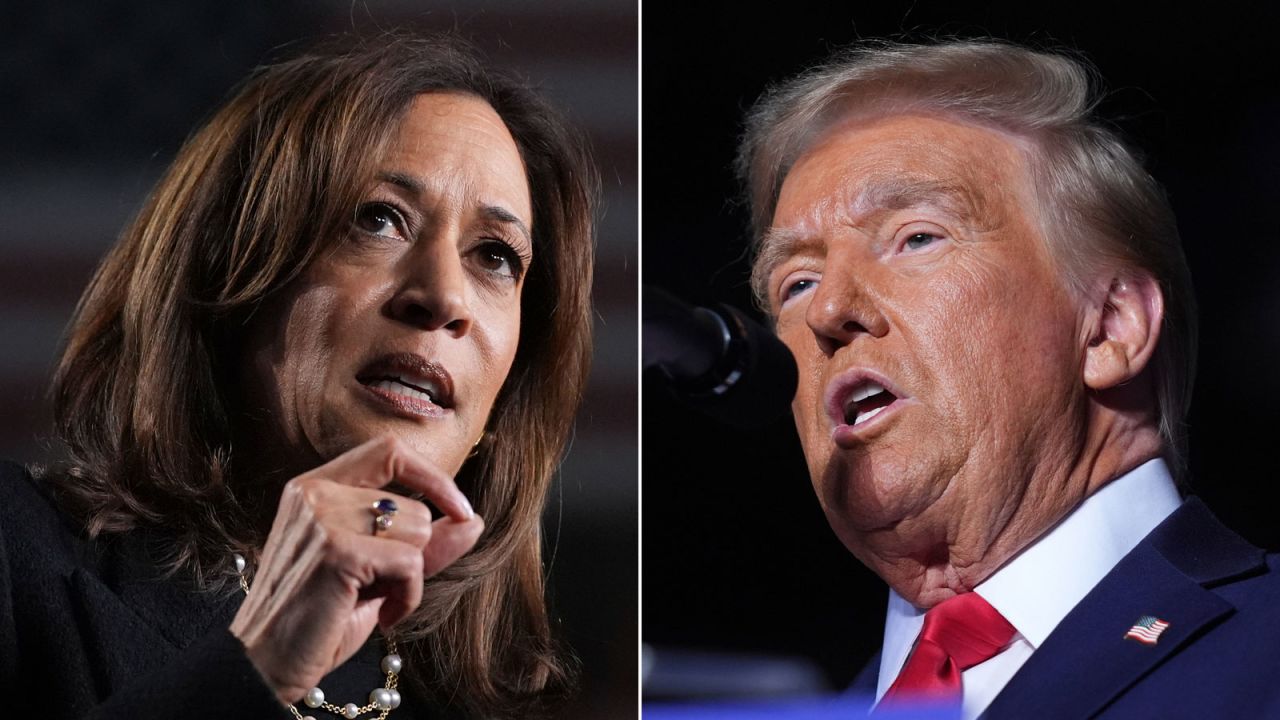
Vice President Kamala Harris and former President Donald Trump. AP
It’s decision day for voters in America’s battle for the White House and control of Congress — even if the results could take days or weeks to sort through.
Vice President Kamala Harris and former President Donald Trump are hoping to win over seven swing states: Michigan, Pennsylvania and Wisconsin, the three Great Lakes states that make up the “blue wall” that Trump cracked in 2016 but President Joe Biden carried in 2020, and Arizona, Georgia, Nevada and North Carolina, the four Sun Belt battlegrounds.
While the election of either candidate would be historic, there’s much more being decided Tuesday, including five states — Arizona, Florida, Missouri, Nebraska and South Dakota — voting on whether to turn back abortion bans with constitutional amendments.
Republicans hope to take advantage of a favorable Senate map, with Democrats defending seats in the red-leaning states of Montana, Ohio and West Virginia. The party’s hopes of holding onto its narrow House majority winds from the coast of Maine through New York’s Hudson Valley, the rolling hills of Virginia’s Piedmont, a “blue dot” in Nebraska and into California’s Orange County, where the political ebbs and flows of the Trump era have been on vivid display.
The initial results in the hours after polls close might not be determinative. States decide their own election procedures, and the order in which states count early, mail-in and Election Day votes varies across the map — as does how quickly certain cities, counties and regions report their results.
Read more about what to expect from the day.
Trump finishes final campaign rally after speaking for nearly 2 hours
From CNN’s Jessie Yeung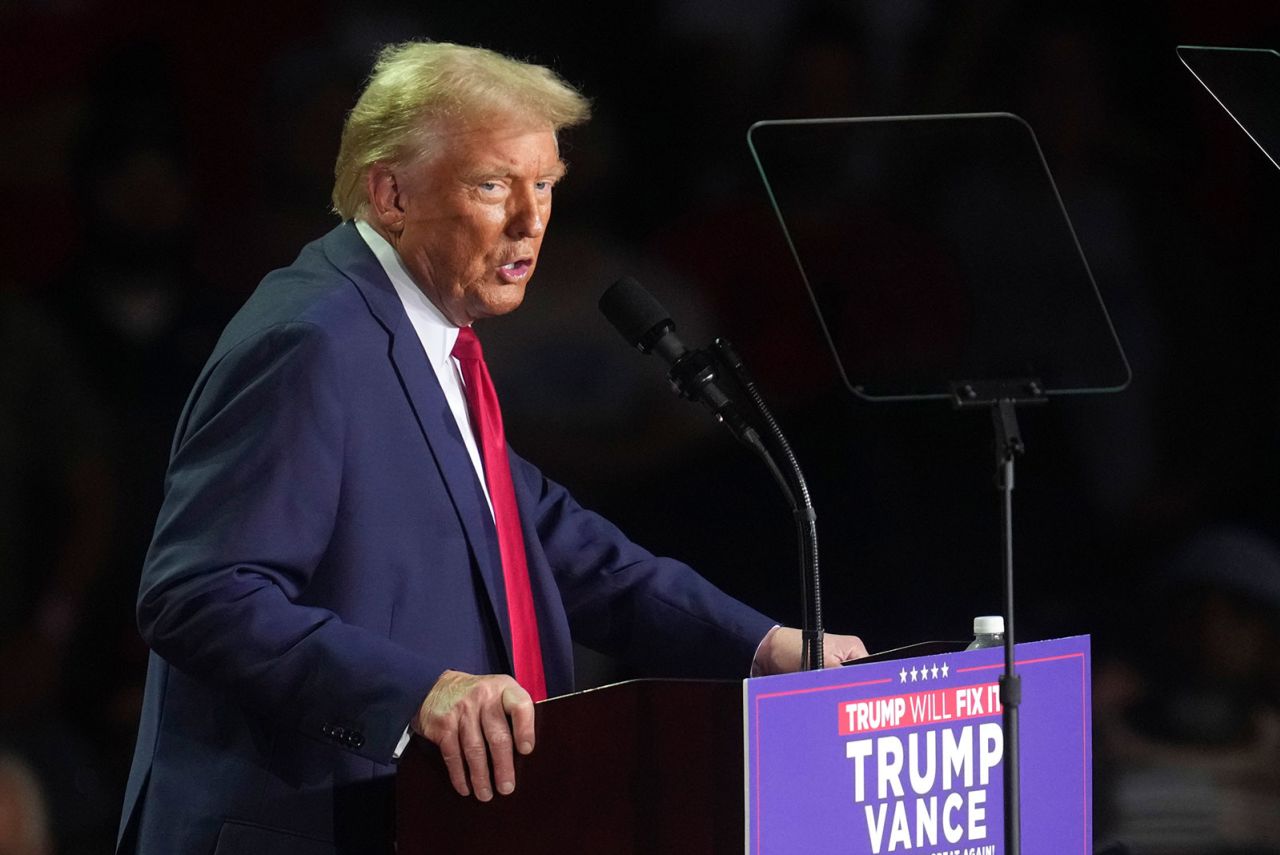
Trump speaks at a campaign rally in Grand Rapids, Michigan on Tuesday. Paul Sancya/AP
Former President Donald Trump has ended his final campaign rally after speaking for nearly two hours in Grand Rapids, Michigan.
He repeated many of his campaign promises, such as vowing to impose hefty tariffs and to crack down on illegal immigration.
At one point he also brought several of his children and their spouses to the stage, who delivered brief remarks, including Tiffany, Eric and Donald Jr.
His marathon address ends a long campaign trail — with Trump saying he had attended more than 900 rallies this year.
Walz says he’s disappointed but not surprised the race is so closely contested
From CNN’s Aaron Pellish
Minnesota Gov. Tim Walz participates in an interview with Stephen Colbert. The Late Show with Stephen Colbert/CBS
Minnesota Gov. Tim Walz said he’s disappointed the race between Vice President Kamala Harris and former President Donald Trump is so closely contested.
In an interview on CBS’ “The Late Show with Stephen Colbert” taped in Bucks County, Pennsylvania last Thursday, Walz laid out the contrast between the two candidates to show that the difference is “stark.”
He said of the election being so closely contested: “It disappoints me, I think, because I think that the choice is so stark, but it’s not surprising.”
“The country’s really divided. There’s been a group of people out there who figured that out, and I think they’ve done a wonderful job of making people think it doesn’t matter, everybody’s the same,” Walz said.
Walz then laid out how he saw the differences between Harris and Trump, particularly noting insults directed toward Puerto Rico made by a speaker at a Trump rally in October.
“In this case, you’ve got the Constitution versus not the Constitution. You’ve got reproductive rights versus I don’t care if you like it or not. I’ll tell you what to do, from Donald Trump in closing with insulting people. I know we’re sitting in Pennsylvania, there’s — there’s 500,000 Puerto Ricans here, and Puerto Ricans, as all Americans, are very proud of where they come from,” he said.
In the past, Walz has expressed some disbelief at the competitiveness of the presidential election. He has regularly mused at private fundraisers and campaign stops that “I’ll go to my grave not understanding” how the election is so close.
Arizona Senate candidate Kari Lake says “silent majority” will back her and Trump
From CNN’s Veronica Stracqualursi
Kari Lake speaks at a campaign rally, Monday, November 4, in Prescott, Arizona. Julio Cortez/AP
Arizona Republican Senate candidate Kari Lake has held her final campaign rally, telling supporters that on Tuesday they have “a chance to change the trajectory of this country and save this Republic.”
Campaigning on the steps of the Yavapai County Courthouse in Prescott, Arizona on Monday — where US Sen. Barry Goldwater of Arizona launched his presidential campaign — Lake, a former TV newscaster up against Democratic Rep. Ruben Gallego in a key Senate race, argued that the “Make America Great Again” movement “is not dead,” and claimed that a “silent majority” will back her and former President Donald Trump tomorrow.
Lake and Gallego, a Marine veteran who represents Arizona’s 3rd congressional district, are vying for the pivotal Senate seat held by independent Sen. Kyrsten Sinema.
Lake, who did not concede her 2022 election loss and promoted Trump’s false theories about the 2020 election, said she believes in “fair and honest elections” and argued “I really believe that our Founding Fathers never envisioned we’d have elections that are run so horribly.”
“That’s why they never put in term limits because they figured we’d be able to vote the people that we didn’t respect out of office. And unfortunately, we haven’t been able to do that. And we’re going to change that after January. But the only way to change that is to show up in such a massive movement that we have their heads spinning,” she said, pointing to the media.
She also thanked GOP congressional candidate Abe Hamadeh and said: “When they did to us what they did to us in 2022, and everyone else ran and hid, guess who stood with me and said, damn it, we’re going to fight — Abe Hamadeh.”
She argued the election is not “Republican-Democrat anymore” but “Americanism versus communism.”
Trump teases using sexist language to refer to Nancy Pelosi
From CNN’s Jessie Yeung
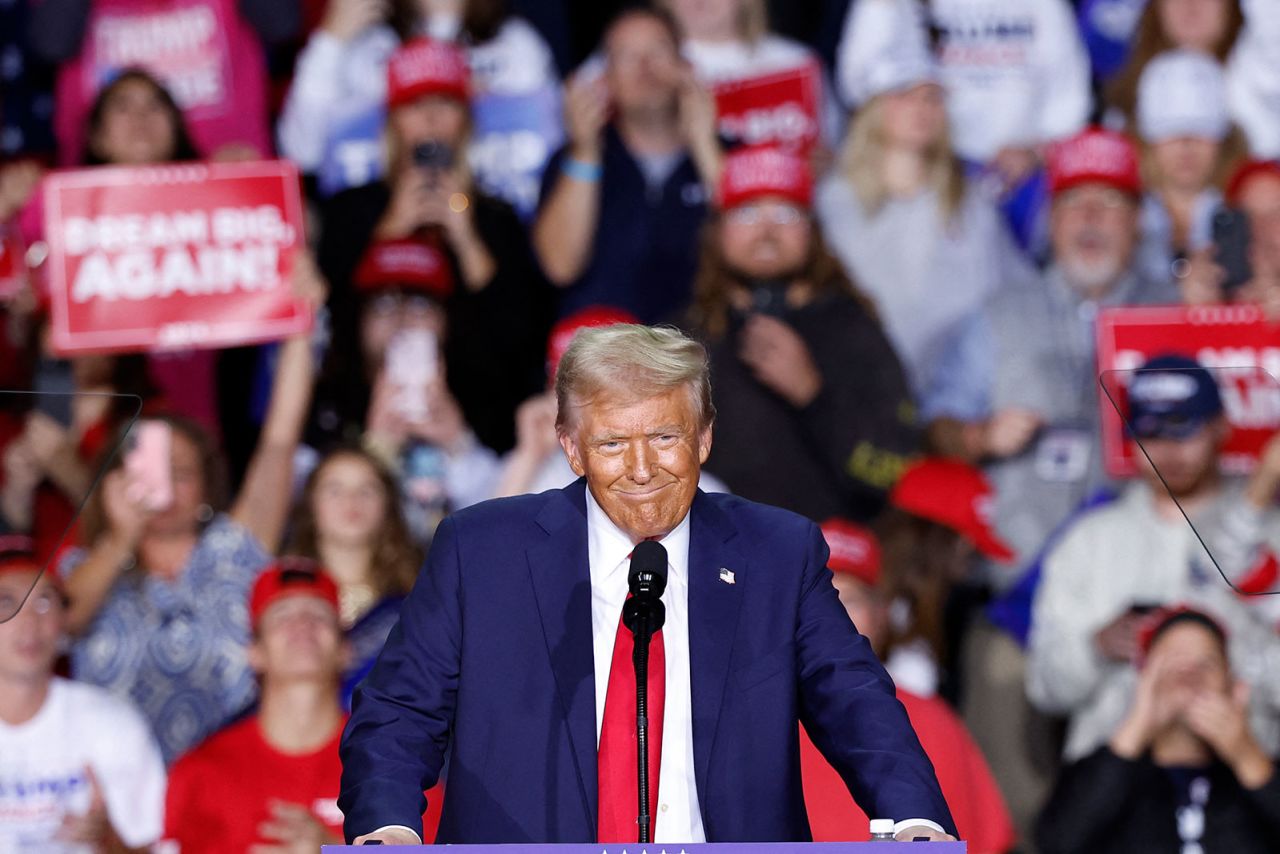
Former President Donald Trump speaks during a campaign rally in Grand Rapids, Michigan on Tuesday, November 5. Kamil Krzaczynski/AFP/Getty Images
Former President Donald Trump slammed US Rep. Nancy Pelosi during his final rally in Grand Rapids, Michigan, verging on using a profanity to describe the former House Speaker.
“She’s a crooked person, she’s a bad person. Evil, she’s an evil, sick, crazy bi— It starts with a ‘B’ but I won’t say it. I wanna say it,” Trump said to cheers from the crowd.
“I don’t use much (foul language), you know, every once in a while, and it’s never a real bad word, it’s never bad … But it is a little better when you use foul language. These are bad people,” he said.
Trump constantly rails against Pelosi and recently called the California Democrat “an enemy from within.”
Throughout the end of his campaign trail, Trump’s message has gotten increasingly dark and often offensive. At an event in North Carolina last week, Trump chuckled approvingly at an audience member’s suggestion that Vice President Kamala Harris worked as a sex worker.
Harris will spend Election Day doing radio interviews
From CNN’s Brian Rokus
Vice President Kamala Harris will spend Election Day in Washington, DC and participate in radio interviews, according to her office.
Trump has held his final campaign rally in Grand Rapids in 3 presidential races
From CNN’s Jessie Yeung
Former President Donald Trump has taken the stage in Grand Rapids, Michigan — giving the city a special shout-out for being the location of his final rallies in past presidential campaigns.
“I want to say a very special hello to Grand Rapids, it’s been a special place, remember 2016?” he said to a cheering crowd that chanted his name.
Trump previously also finished his campaign trail in the city in 2016 and 2020.
NOW: Trump is speaking at his final rally in Grand Rapids, Michigan
From CNN staff
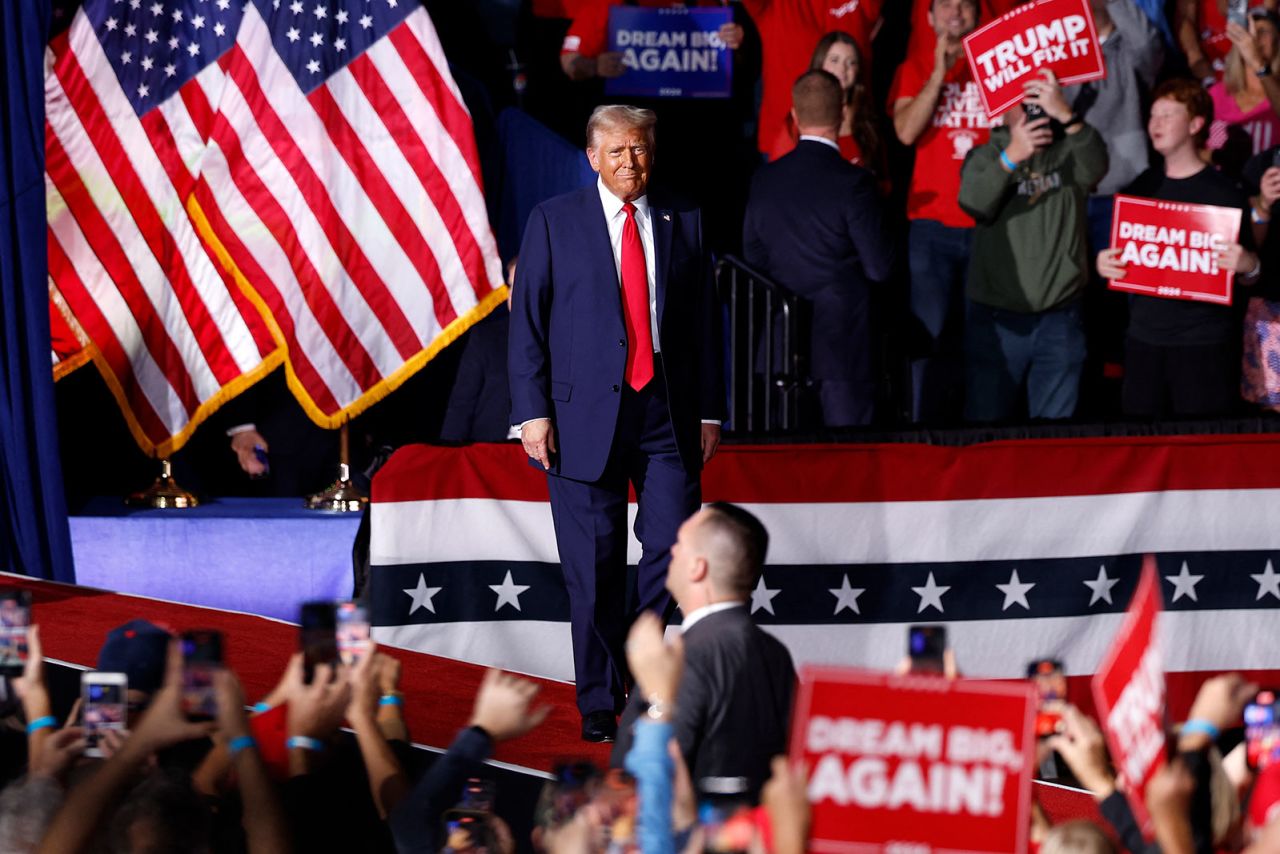
Former President Donald Trump walks on stage for his final campaign rally in Grand Rapids, Michigan on Monday, November 4. Kamil Krzaczynski/AFP/Getty Images
Former President Donald Trump is speaking at his final rally in Grand Rapids, Michigan, where he ended both his 2016 and 2020 campaigns. His remarks were originally slated for 10:30 p.m. ET.
Grand Rapids is a Western Michigan city in Kent County, which swung from Trump in 2016 to Joe Biden in 2020.
Harris and Trump tie in Dixville Notch midnight vote to kick off Election Day
From CNN’s Gary Tuchman
Video Ad Feedback
00:52 – Source: CNN
Vice President Kamala Harris and former President Donald Trump have tied with three votes each in the tiny New Hampshire township of Dixville Notch, kicking off Election Day in one of the first places in the country to report its presidential preference.
Four Republicans and two undeclared voters participated.
The unincorporated township, located along the US-Canada border in New Hampshire’s northern tip, opened and closed its poll just after midnight ET in a tradition that dates back to 1960.
Read more about how Dixville Notch voted.
Harris calls on Pennsylvania voters to turn out, saying “the race ain’t over yet”
From CNN’s Jessie Yeung
Vice President Kamala Harris speaks during a campaign rally in Philadelphia, Pennsylvania, on Monday, November 4. Hannah McKay/Reutes
Speaking at her final campaign rally in Philadelphia before Election Day on Monday night, Vice President Kamala Harris said her team was “optimistic and excited” — but urged voters to make their voices heard, saying Pennsylvania could “decide the outcome” of the election.
“The race ain’t over yet, and we must finish strong. This could be one of the closest races in history. Every single vote matters,” she said.
“With only a few hours left, we still have work to do, and as you’ve heard me say before, we like hard work,” she added.
At points, the crowd broke into cheers of “We will win” and “We’re not going back.”
Harris reiterated several campaign promises, such as lowering the cost of living, housing, childcare, elderly home care, and taxes for workers and small businesses. She also vowed to pass a bill to restore reproductive freedoms after the rolling back of Roe v. Wade.
She sought to contrast herself with Donald Trump by using several familiar refrains — such as promising a seat at the table to those who disagree with her, compared to the former president’s often vehement rhetoric against his political opponents.
“We started this campaign 107 days ago,” she said. “From the beginning, ours has not been a fight against something, it has been a fight for something. A fight for a future with freedom, with opportunity, and with dignity for all Americans.”
“Tonight, we finish as we started — with optimism, with energy, with joy, knowing that we the people have the power to shape our future, and that we can confront any challenge we face when we do it together.”
NOW: Harris speaking in Philadelphia in final rally before Election Day
From CNN staff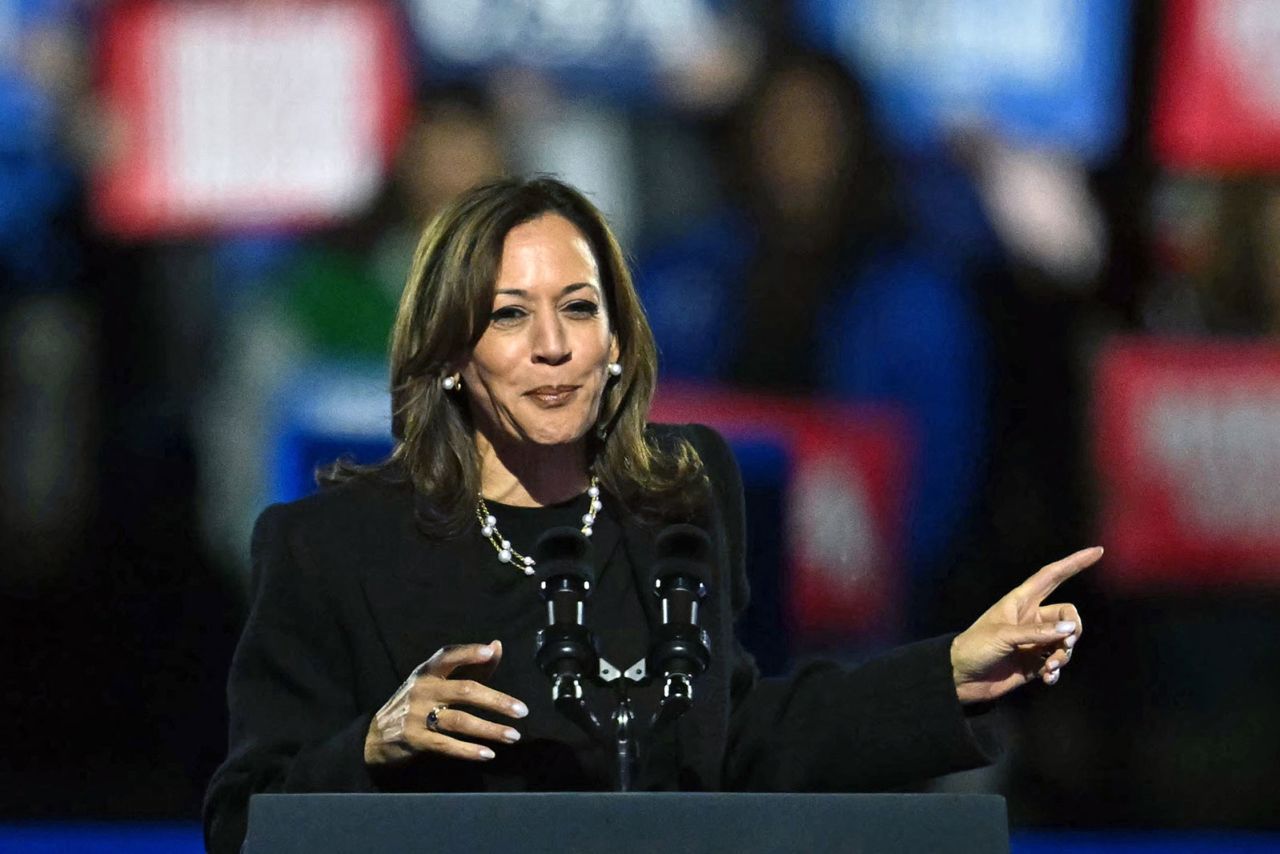
Vice President Kamala Harris speaks during a campaign rally in Philadelphia, Pennsylvania on Monday,November 4. Angela Weiss/AFP/Getty Images
Vice President Kamala Harris is speaking at a rally in Philadelphia, her final stop in front of voters before Election Day.
Harris has made the key battleground of Pennsylvania her priority on Monday with several stops across the state culminating in her final one in the state’s largest city.
She was joined by Oprah Winfrey and Lady Gaga, among other celebrities, musicians and elected officials at the famous “Rocky Steps” at the Philadelphia Museum of the Arts.
Oprah takes the stage at Harris rally with 10 first-time young voters
From CNN’s Jessie Yeung
US television producer Oprah Winfrey arrives on stage with 10 first-time Philadelphia voters during a rally for Kamala Harris in Philadelphia, Pennsylvania, on November 4, 2024. Angela Weiss/AFP/Getty Images
Oprah Winfrey took the stage at Kamala Harris’ final rally in Philadelphia on Monday night alongside 10 young people – all first time voters.
“The policies that Kamala Harris has proposed for women’s reproductive rights and education equality are what led me to cast my ballot for her,” one voter told Winfrey.
Another first-time voter said it was especially significant for him as an African American to “exercise my right to vote, which my ancestors fought so hard for.”
“We don’t get to sit this one out,” Oprah said.
“If we don’t show up tomorrow, it is entirely possible that we will not have the opportunity to ever cast a ballot again.”
“We are voting for healing over hate,” she said.
“What you can do for your country, what you can do for democracy here, and what you can do for the spirit of John Lewis and all the others who dared to walk across that bridge in Selma and fight for justice for us all … What you can do for every pregnant young woman who has died bc she was not eligible to receive the emergency medical care she desperately needed bc of an abortion ban, what you can do for everyone and everything you cherish — is vote.”
Lady Gaga performs “God Bless America” at Harris’ final rally in Philadelphia
From CNN’s Jessie Yeung

Lady Gaga waves before performing during a campaign rally for Vice President Kamala Harris in Philadelphia, Pennsylvania on Monday, November 4. ( Angela Weiss/AFP/Getty Images
Musical superstar Lady Gaga appeared at Vice President Kamala Harris’ final rally in Philadelphia, performing a rendition of “God Bless America.”
“For more than half of this country’s life, women didn’t have a voice. Yet we raised children, we held our families together, we supported men as they made the decisions,” she said in brief remarks after her performance. “But tomorrow, women will be a part of making this decision.”
Oprah Winfrey is also expected to make an appearance tonight, before Harris delivers remarks.
Walz focuses on abortion during final campaign rally in Michigan
From CNN’s Aaron Pellish
Minnesota Gov. Tim Walz focused heavily on access to abortion and reproductive health care, driving home a core message of Vice President Kamala Harris’ campaign in Detroit, Michigan on Monday.
In his remarks at Hart Plaza overlooking the Detroit River, Walz reiterated his attacks on former president Donald Trump, who claimed to be the “protector” of women and said he would look after women “whether they like it or not” at a campaign rally in Wisconsin last week.
He also made a direct pitch to male voters on abortion, asking them to consider the implications of abortion restrictions on the women in their lives.
“Let me speak to the guys in the crowd tonight. I want you to think about the women in your life that you love. Their lives are at stake in this election. Donald Trump appointed those Supreme Court justices who repealed Roe versus Wade, and he brags about it. He is glad that those women you’re thinking about and you love have fewer rights than their mothers and their grandmothers,” he said.
“We’re seeing women turned away from emergency rooms, miscarrying in parking lots, whether they like it or not. Survivors of rape being forced to carry those pregnancies to term, whether they like it or not. Fertility clinics turning couples away at the door, whether they like it or not,” he said.
“Now, tomorrow, women all across America of every age, both parties, are going to send a loud and clear message to Donald Trump, whether he likes it or not.”
Harris offers Americans a chance to turn the page on Trump — without mentioning him
From CNN’s Gregory Krieg
Vice President Kamala Harris appears during a campaign rally in Pittsburgh, Pennsylvania, on Monday, November 4. Quinn Glabicki/Reuters
Her message has been consistent, but Kamala Harris has in the closing days of the presidential race dropped two notable words from her stump speech: Donald Trump.
The former president’s name was again absent from the vice president’s speech on Monday night in Pittsburgh, where she again promised voters a clean break from the discord of the Trump era in American politics. It was a notable switch in rhetoric for the vice president, who had mentioned Trump’s name so often in previous versions of her stump speech that the Republican’s campaign had put together a video compilation of Harris saying “Donald Trump” that he often played at rallies.
“We have an opportunity in this election to finally turn the page on a decade of politics driven by fear and division. We are done with that,” Harris said. “We’re done. We’re exhausted with it.”
That promise has been threaded through her campaign, usually implied but increasingly delivered in explicit terms.
“It can be easy to forget a simple truth,” Harris said in Washington. “It doesn’t have to be this way.”
The way it is, she said in Pittsburgh, is not so good.
“So much about these last several years has been about trying to make people point their fingers at each other,” Harris said, “to have Americans point their fingers at each other, to try and make people feel alone or feel small.”
Elon Musk cancels virtual town hall event minutes after it started after technical problems
From CNN’s Clare Duffy
Elon Musk held a digital version of the town-hall-style rallies he has hosted on behalf of former President Donald Trump. But the event on X ended just a few minutes after it started on Monday night, when Musk encountered technical difficulties.
The event began streaming more than 20 minutes after its scheduled 8 p.m. ET start time. When the billionaire X owner joined, he promoted a podcast interview he did with Joe Rogan and offered to take questions. An operator then attempted to take questions from four listeners who apparently had been on hold, but the line went silent when he called on them.
The operator asked Musk if he believes “we will win” on Tuesday — presumably referring to Trump, whom Musk has supported to the tune of tens of millions of dollars.
“Well, I think if people vote tomorrow, we’re definitely going to win,” he said.
Musk then called off the event, saying: “let’s cancel this, since we seem to be having some technical issues.” Musk promised to start a regular livestream spaces event on X. The X Spaces event Musk started immediately following the town hall, lasted one minute and appeared to have no audio.
Minutes later, Musk said he would not restart his Q&A and encouraged followers to listen to his Rogan interview instead, during which the podcaster endorsed Trump.
The Monday town hall is just the latest election-related event that Musk attempted to host on X that was plagued by technical difficulties.
An August interview between Musk and Trump that was streamed on X was delayed by more than 40 minutes because of glitches. Musk blamed the issue on a cyberattack, but some experts speculated it was simply caused by too many users trying to listen. A similar event last year to kick off Florida Gov. Ron DeSantis’ presidential campaign was also delayed by 25 minutes and marred by technical difficulties.
Why these 7 battleground states could determine who wins the election
From CNN’s Zachary B. Wolf
People cast their early ballots at a polling station in Grand Rapids, Michigan, on November 2. Carlos Osorio/Reuters
There are thought to be seven states that could conceivably be won by either candidate. As a result, the campaigns have focused their energy in these areas. They can be broken up into two general categories:
3 Midwestern battlegrounds, aka “the blue wall” – These are the manufacturing and union-heavy states of Pennsylvania, Michigan and Wisconsin. They used to be more reliably Democratic but have shifted in recent years as their populations have changed and as former President Donald Trump has appealed to White voters without a college degree.
When Trump won the White House in 2016, he won all three. When President Joe Biden won in 2020, he won all three. If Vice President Kamala Harris wins all three this year, she will likely have the electoral votes to be president. But polls suggest close races in all three. Turnout will be key, which for Harris means appealing to suburban women and Black voters. All three states have urban centers.
The blue wall states usually vote the same way. The last time they did not all go to the same candidate was in 1988 – notably also a year when California was red and West Virginia was blue. In those eight elections since 1988, the only time the blue wall states went to a Republican was in 2016, when they were won by Trump.
4 Sun Belt battlegrounds – These states with growing populations include Arizona and Nevada in the West and North Carolina and Georgia in the East. Arizona, Georgia and North Carolina used to be more reliably Republican. Trump won North Carolina twice, but the margins were close in 2020. The last Democrat to win there was Barack Obama in 2008. Biden was the first Democrat to win Georgia since Bill Clinton in 1992 and Arizona since Clinton in 1996.
Here are more key things to know about the US election works.
Ahead of election night, meet the 2024 Democratic and Republican candidates
From CNN’s Ethan Cohen, Molly English and Matt Holt
Former President Donald Trump and Vice President Kamala Harris. Getty Images
Ahead of election night, read up on the 2024 candidates on the Democratic and Republican tickets vying to win the White House.
Vice President Kamala Harris is the Democratic candidate for president. The daughter of immigrants from India and Jamaica, Harris grew up in Oakland and spent much of her political career in California’s Bay Area.
She was first elected as the San Francisco district attorney in 2004, before later serving as the attorney general of California. After that, Harris was elected to the Senate before being picked to be President Joe Biden’s running mate in the 2020 election.
She announced her own candidacy for the Democratic nomination for president after Biden withdrew from the ticket and endorsed her on July 21. Harris is the first Black woman and first Asian American to lead the ticket of a major political party.
Minnesota Gov. Tim Walz is Harris’ running mate. Before being elected to Congress to represent the state’s 1st Congressional District in 2007, Walz was a high school geography teacher and an assistant football coach. He also served in the Army National Guard. Walz has been serving as Minnesota governor since 2019.
Former President Donald Trump is the Republican candidate for president, aiming to become only the second commander in chief to win two nonconsecutive terms.
Trump, who was born in New York, graduated from the University of Pennsylvania with a bachelor’s degree in economics. Before launching his successful 2016 presidential bid, Trump was a real estate developer, businessman and a reality television star as host of “The Apprentice.”
Ohio Sen. JD Vance is Trump’s running mate. Born in Middletown, Ohio, Vance wrote a memoir, Hillbilly Elegy, about his upbringing and white, working-class Americans. He also attended Yale Law School, worked as a venture capitalist and served in the US Marine Corps.
Vance was elected to the Senate in 2023, outlasting a stronger-than-expected challenge from Democrat Tim Ryan and keeping the seat under GOP control.

US election live: Latest polls show Harris, Trump tied on election eve

Elon Musk’s $1m US voter giveaway to continue, Pennsylvania judge rules

Trump or Harris? Gaza war drives many Arab and Muslim voters to Jill Stein

Joe Rogan endorses Trump on eve of the election

Trump describes US as an occupied country in dark closing message focused on immigration
Trending
-

 The Washington Post4 months ago
The Washington Post4 months agoAre you still registered to vote? How to make sure you’re up to date.
-
Debates4 months ago
Donald Trump Vs Kamala Harris LIVE | The Big 2024 Debate | U.S. Election Latest
-
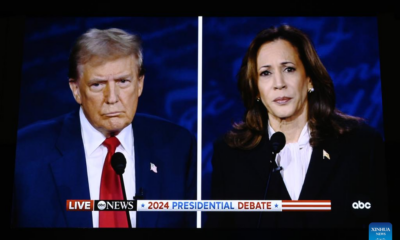
 Donald Trump4 months ago
Donald Trump4 months agoWas Harris’s debate performance enough to win over undecided voters?
-
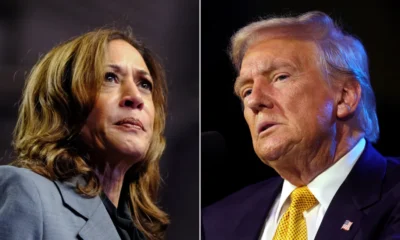
 CNN4 months ago
CNN4 months agoCNN Poll: Harris and Trump are tied in North Carolina, while vice president leads in Nebraska’s 2nd District
-
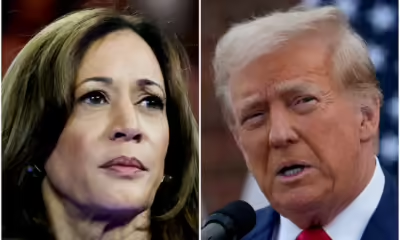
 BBC4 months ago
BBC4 months agoChina is part of the US election – but only from one candidate
-
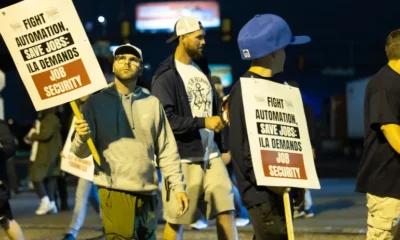
 Al Jazeera4 months ago
Al Jazeera4 months agoCould US port strike be the ‘October surprise’ that trips up Kamala Harris?
-
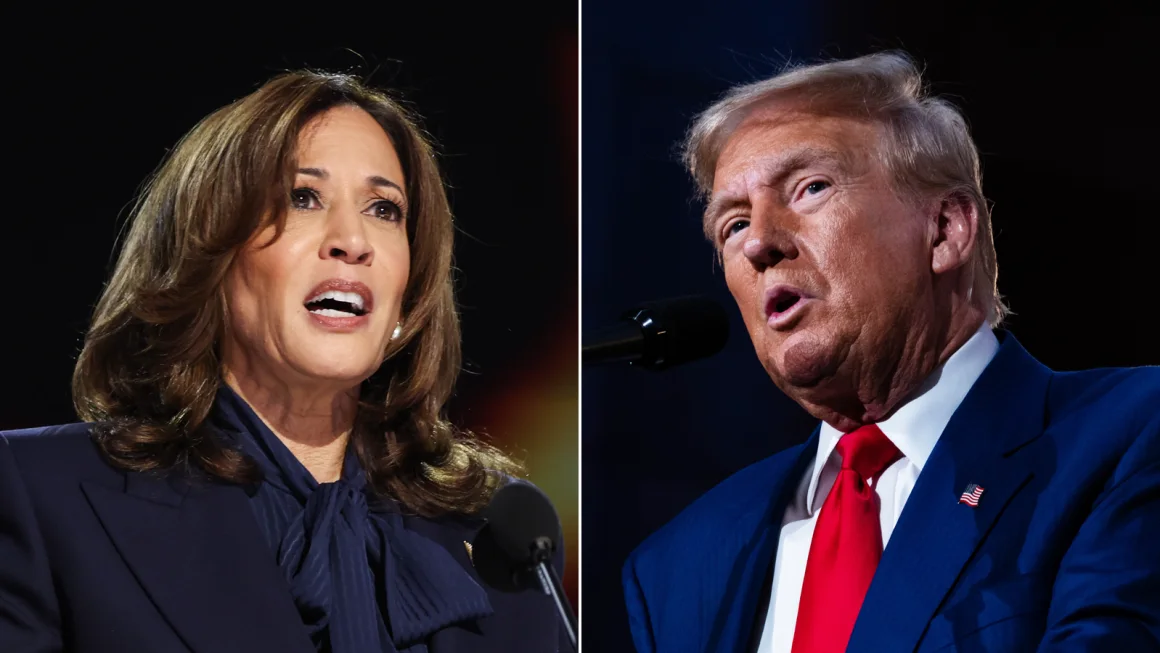
 CNN4 months ago
CNN4 months agoHarris braces for the most critical moment of her political career at debate with Trump
-
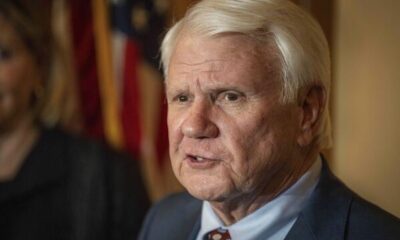
 AP4 months ago
AP4 months agoGeorgia Republican leader seeks policy changes after school shooting but Democrats want more








